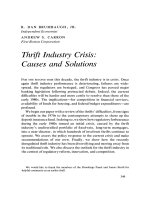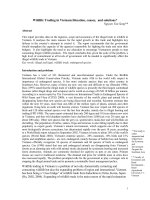Đề Tài Culture Shocks Causes And Solutions.pdf
Bạn đang xem bản rút gọn của tài liệu. Xem và tải ngay bản đầy đủ của tài liệu tại đây (1.62 MB, 13 trang )
<span class="text_page_counter">Trang 1</span><div class="page_container" data-page="1">
<b>TRƯỜNG ĐẠI HỌC THƯƠNG MẠIKHOA KINH TẾ VÀ KINH DOANH QUỐC TẾHọc phần: Tiếng anh chuyên ngành 2Giảng viên: Nguyễn Thị Xuân Phương</b>
</div><span class="text_page_counter">Trang 2</span><div class="page_container" data-page="2"><i><b>a, Objective causes... 3</b></i>
<i><b>b, Subjective causes... 5</b></i>
<b>3. Symptoms of culture shock...6</b>
<b>4. Stages of culture shock...9</b>
<i><b>a, The honeymoon stage:... 9</b></i>
<i><b>b, The frustration stage:... 9</b></i>
<i><b>c, The adjustment stage:... 9</b></i>
<i><b>d, The acceptance stage:... 10</b></i>
<b>5. Solutions to culture shock...10</b>
<b>III. CONCLUSION...11</b>
</div><span class="text_page_counter">Trang 3</span><div class="page_container" data-page="3"><b>I. INTRODUCTION</b>
In an era of increasing globalization, the interactions between diverse cultures have become more frequent and integral to our daily lives. However, this cultural interconnectedness often gives rise to a phenomenon that many individuals experience – culture shock. As individuals traverse geographical and cultural boundaries, they encounter new customs, beliefs, and societal norms that may diverge significantly from their accustomed ways of life. The clash between one's own cultural background and the customs, values, and behaviors of the new culture can lead to feelings of disorientation, confusion, and anxiety. Understanding the causes of culture shocks and exploring possible solutions is crucial for individuals to effectively navigate and adapt to these challenges.
Understanding and addressing the root causes of culture shock is crucial for fostering cross-cultural understanding and promoting a more harmonious global community. Discussing this issue, our group chose the topic “Culture shocks: Causes and solutions" as the topic of discussion for this module. This essay delves into the causes of culture shocks, exploring the underlying factors that contribute to this phenomenon, and subsequently examines potential solutions to mitigate its impact on individuals navigating through the intricate tapestry of diverse cultures.
<b>II. ANALYSIS1. Definition</b>
What is culture shock?
</div><span class="text_page_counter">Trang 4</span><div class="page_container" data-page="4">“Culture shock” can be defined as 'the physical and emotional discomfort a person experiences when entering a culture different from their own' (Weaver, 1993). It is a time when a person becomes aware of the differences and/or conflicts in values and customs between their home culture and the new culture they are in. Common feelings may be anxiety, confusion, homesickness, and/or anger.
For example:
+ Being offended by perceived rudeness of a culture. + Not understanding workplace norms.
+ Struggling to navigate the bureaucracy of a new country. + Difficulty with communicating “language barrier” + Struggling to eat the food in a new country.
<b>2. Causes of culture shock</b>
Culture shock can occur when people move to another city or country, such as when retiring abroad. Culture shock can also occur when people go on vacation, travel in retirement or for business, or study abroad for school.
<i><b>a, Objective causes </b></i>
The result of cultural shock seems to be a function of the difference between themselves and foreign culture in many aspects, such as climate, food, language,
</div><span class="text_page_counter">Trang 5</span><div class="page_container" data-page="5">costumes, behavior, other values, and demographic-related differences, such as age, gender, socioeconomic class, education, etc.
Firstly, climate is a distinctly recognizable factor and can have a good or bad impact on some newcomers. Taking a Vietnamese manager coming to Ottawa (Canada) for business in winter as an example, it certainly takes a quite long time for him to adapt to the climate because in this place, the winter is very cold, even sometimes the temperature drops below -37 degrees C.
Secondly, some newcomers can see that foreign foods are weird, tastes and cooking methods are different. It is possible that some people cannot eat strange food, or poorly eat, affecting both health and spirit. For example, Vietnamese people who come to work in India will be shocked because Muslim Indians are not allowed to eat pork and beef. Although these two types of meat are commonly eaten by Vietnamese people, when they come to India, they will definitely be surprised and find it difficult to adapt.
Thirdly, always listening and speaking in foreign languages makes newcomers stressful. They will miss their mother language. Even when they are very fluent in the foreign language of their host country, the intonation and the way of speaking of indigenous people also takes them quite a long time to be familiar. For example, Vietnamese students study abroad in Japan. Despite having learned the Japanese language for a long time in Vietnam, it is certain that when they come to this country, they will be quite surprised and confused because everyone around them will communicate in Japanese. The form of Japanese letters is also different from Vietnamese letters, so it will take Vietnamese people a long time to adapt.
Moreover, if people are accustomed to hot weather, they may be uncomfortable when wearing heavy winter clothes, or sometimes, just because they have a different style of dress from the host country, newcomers may find themselves different and difficult to adapt. Not everyone hates how foreigners dress, but newcomers themselves feel embarrassed when they dress differently. In Muslim-majority nations, cultural norms often dictate that women should cover their bodies, opting for modest attire that typically reveals only their faces. This stands in contrast to the more relaxed and diverse wardrobe choices embraced by the Vietnamese, who dress comfortably and freely in various styles. Consequently, when Vietnamese individuals visit countries like India, where
</div><span class="text_page_counter">Trang 6</span><div class="page_container" data-page="6">conservative clothing norms are prevalent, they might feel a sense of restriction. Wearing clothing considered too casual by local standards may lead to negative judgments from others.
Every culture has its unwritten principles, like how people treat each other. There are always some unspoken, well-understood rules in every society, such as your new environment. These things have a direct impact on the day-to-day functioning of the society. Practices such as greetings, social interactions, and norms around personal space can vary greatly between cultures. Adjusting to these differences can lead to feelings of confusion or discomfort. For example, Vietnamese students studying abroad will feel that foreigners seem cold, aloof or always busy. If being in the center of big cities like Paris, Sydney, London, they will feel this more strongly.
Culture forms from the set of values, standards, preconception and beliefs. Sometimes they will be surprised and disappointed because people don’t have the same values as them, because we all assume that our values are the norm. Since then, some newcomers can feel tired, confused and find it difficult to socialize.
<i><b>b, Subjective causes </b></i>
In addition to objective reasons due to differences between cultures that people cannot influence and change, there are some subjective reasons that newcomers themselves have not prepared carefully and had the necessary knowledge to adapt to the new culture. These causes can be disabled if they have sufficient capacity and belief.
Firstly, when newcomers have not learned clearly or investigated the country, people, culture and customs of the place they are going to, they will take a long time to adapt to the new culture and even be “shocked”. For example, Vietnamese international students will experience time shock when they study abroad in the US. Because the time difference between Vietnam and the US is 12 hours. So they will have insomnia or not be able to follow their daily routine properly.
Secondly, language, skills and friendliness are necessary for a newcomer when coming to a new culture. Despite having a good grasp over the language spoken in your study country, it will be a new experience altogether when you interact with the locals in real-life. This includes not only the literal language spoken, but also non-verbal communication cues and social norms related to language use. For example, Canadians
</div><span class="text_page_counter">Trang 7</span><div class="page_container" data-page="7">call $1 a Lonnie and $2 a Toonie; and one of the most common coffees here is a Double-Double.
Thirdly, there is no preparation for solutions if there are difficulties. In any case and every problem, research and preparation of solutions are always essential. Knowing what they are missing and the difficulties that may be encountered and preparing solutions to overcome these difficulties will help newcomers avoid or quickly overcome the culture shock and perform well their work. For example, Vietnamese people export labor to Japan. They often do the procedures quickly and do not research carefully because the goal is to go to Japan to make money immediately. Because it leads to many jobs arising while living in Japan that make them unable to adapt.
In addition, sometimes the negative thoughts that “I cannot adapt to this new culture” lead to cultural shock. For newcomers, active and positive thinking is extremely important because only if they have positive thoughts, they can get motivation to overcome cultural barriers. For international students in general, being away from family, relatives, and friends is difficult in the beginning when studying abroad. They will miss a lot and will sometimes have negative thoughts that disrupt their own lives.
Finally, another cause of culture shock is that being self contained does not want to communicate and make friends. Making friends is extremely important not only in their country but also in other countries. This helps them quickly integrate with the new environment. The Korean culture of giving gifts when settling in a new place is very good. Koreans will bring traditional rice cakes "tteokbokki" to give to neighbors around their residence. The purpose is to make friends, get acquainted, and help each other when something happens.
<b>3. Symptoms of culture shock</b>
Culture shock can manifest in various ways, and its symptoms can vary from person to person. The symptoms of culture shock are quite varied and can be easily misunderstood or even overlooked because they are similar to reactions that can occur in everyday life. The link between culture shock and what you are feeling at a given moment may be difficult to see. It is very common for people experiencing culture shock to not only deny the possibility that culture shock might be the problem, but to shift the
</div><span class="text_page_counter">Trang 8</span><div class="page_container" data-page="8">focus, attributing their stress wholly to the behavior or values of the people around them. Here are some common symptoms of culture shock:
- Anxiety or stress: Maybe you’ve always been a fairly confident, adventurous person. Lately, though, you feel hesitant to try new things. Your mind processes a catalog of “what if’s” before each new decision. While some concerns are normal, culture shock can cause nagging, anxious thoughts to take up more mental real estate than they deserve. Specially feeling overwhelmed or anxious when faced with unfamiliar situations, people, or environments.
Common anxieties that show up when facing culture shock include: ● A general, undefined sense of anxiety
● Preoccupation with your health ● Sense of dread
● Excessive fear of being cheated, tricked, or robbed ● Inordinate concern over the safety of the food served to you ● Preoccupation with overall cleanliness
● Doubts about your ability to navigate this new experience
- Depression: Feeling sad, lonely, or hopeless due to the challenges of adapting to a new culture. Example lately you’ve felt kind of low and in a funk. Your co-workers invite you to hit the town and explore some local street food—something you would normally enjoy—but the thought just doesn’t excite you anymore.
Depression stemming from culture shock can show up in many forms. Some of the most common include:
● Loneliness
● Feeling lost or helpless ● Feeling especially vulnerable
● Lack of motivation to do things you once enjoyed ● Feeling like you’ve lost a sense of your identity ● Inability to complete tasks
</div><span class="text_page_counter">Trang 9</span><div class="page_container" data-page="9">- Physical symptoms: Experiencing physical discomfort or symptoms such as headaches, fatigue, digestive problems or sleep disturbances due to stress and difficulty adjusting. You can imagine that Your body aches and you’ve been getting these wild headaches all week. It’s hard to sit through team meetings because you’re so uncomfortable, but you can’t imagine asking for another sick day… you’ve already used up more this month than you usually use in a year!
Sometimes the emotional stress of adapting to a new culture plays out in our bodies. Things you might notice include:
● Feeling “off” with no apparent explanation
● Aches and pains – sometimes just when one resolves another starts ● Sleep disturbances
● Resurgence of chronic health issues
- Loss of confidence: Feeling insecure or unable to adapt to a new culture or communicate effectively in a foreign language. In more serious cases, Prior to interacting with your host culture you may or may not have struggled with self-doubt. Now, however, you find yourself doubting your choices (big and small) as well as doubting your very sense of self. These doubts can appear a number of ways including:
● Questioning your decision to do this work ● Feeling more shy or insecure than normal
● Questioning long-held beliefs about religion, gender, morality, or other core convictions
● Feeling like you’re an imposter
● Questioning your ability to overcome adversity There are also many other common symptoms such as:
- Feelings of homesickness: Missing family, friends, familiar surroundings, and habits of one's homeland or culture.
- Frustration or irritation: Easily becomes frustrated or irritated by cultural misunderstandings, language barriers, or differences in social norms.
</div><span class="text_page_counter">Trang 10</span><div class="page_container" data-page="10">- Withdrawal or isolation: Withdrawing from social interactions or avoiding acculturation due to feelings of discomfort or insecurity.
- Difficulty concentrating: Difficulty concentrating or concentrating on tasks due to distractions, stress, or emotional distress related to culture shock.
- Negative attitude toward the host culture: Feeling resentful, judgmental, or critical of the host culture or its customs.
<b>4. Stages of culture shock</b>
Culture shock generally moves through four different phases: honeymoon, frustration, adjustment and acceptance. Individuals experience these stages differently, the impact and order of each stage vary widely.
<i><b>a, The honeymoon stage:</b></i>
The honeymoon stage is the first stage of culture shock and it can often last for several weeks or even months. This is the euphoric phase when you’re fascinated by all the exciting and different aspects of your new life. You'll become captivated by your new surroundings, the friends you make and the new cultural experiences of exotic food and languages. In this stage you'll probably still feel and act like a tourist, taking pictures of everything and sending them back home to family and friends. However, the honeymoon period must always come to an end.
<i><b>b, The frustration stage:</b></i>
Frustration may be the most difficult stage of culture shock and is probably familiar to anyone who has lived abroad or travels frequently. This stage usually hits around the three-month mark, although it can be earlier for some individuals. As the excitement gradually disappears, you are continually faced with difficulties or uncomfortable situations that may offend or make you feel disconnected. Even small things like missing the bus, losing items or getting lost may trigger frustration. In this stage, you may feel exhausted and constantly tired of the discoveries you have been making. The aspects of your new life that you found endearing at first may feel irritating or confusing when you’re in the frustration stage.
</div>








